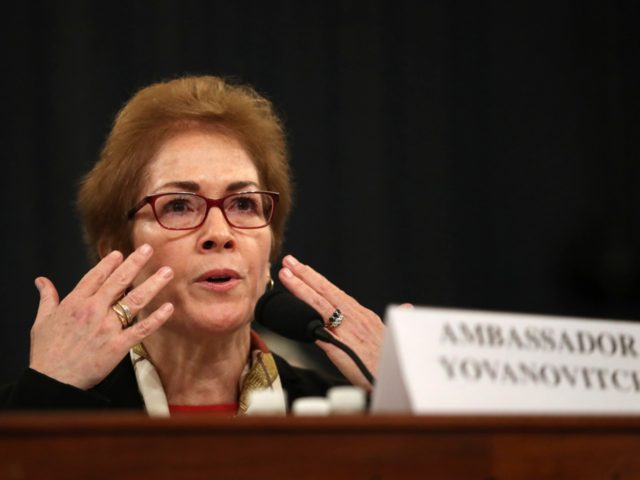
I did not watch all of Marie Yovanovitch's testimony Friday, but I watched much of it. In what I saw, she was an excellent and credible witness. (Being retired from law enforcement, it is something I pay attention to.) It is not my purpose to attack her or her political bent, but the important thing today is that she had no direct information as to the central question: That was President Trump's July 25 phone conversation with the Ukrainian president, Volodymyr Zelenskyy.
It appears that the Republicans did not confront her with allegations that have been made about a couple of things she might have done politically while serving as ambassador to Ukraine. For all I know, it is possible these allegations have been debunked, so I won't bring them up here. As for Trump's tweet attacking her today, I think it was uncalled for, but it doesn't change the issue of whether he deserves to be impeached for his actions in Ukraine.
There was much discussion as to the reasons for her dismissal. As stated many times today, a president can change ambassadors at any time for virtually any reason. Ambassadorships are political positions, rightfully or wrongfully. If a president had a friend, political ally, or big contributor, they could be given an ambassadorship. And this brings up another point, which I learned serving overseas in Thailand and Italy with DEA. Certain posts tend to be filled by political appointees, and certain posts tend to be filled by career foreign service officers of the State Department. Obviously, the more desirable ones, like Paris, Rome, Tokyo, London, and others go to the political appointees. By and large, they are not interested in going to places like Africa and other places where life is not so plush. Kiev is one of those posts. I know because I went there twice in 1994 with DEA International training. Kiev is anything but a desirable post-though it is an important post.
Another lesser known reason why the disparity in ambassadorships is the representational costs. Life as a foreign service officer and ambassador is filled with official events, dinners, and cocktail parties. Places like Paris, Rome and others literally require someone who has the money. I don't know how it is now, but when I was in DEA and involved in similar events, we were not allowed to spend US taxpayer money on things like booze for parties and such. I'm not sure what the State regs were or are now, but I think they had similar restrictions. They literally needed an ambassador who could do some of that out of pocket. Thus, the lesser and more undesirable ambassadorial posts could and can be filled by career State employees as was the case in Ukraine with Yovanovitch.
But what is important is that a president can remove an ambassador at any time. In fact, when administrations change, especially with a president of a different party, ambassadors expect to be replaced. If a president deems that a current ambassador is not in agreement with administration policy, a change can be expected. It is important to underline that US foreign police at any time is not the policy of the State Department; it is the policy of the current administration, and the State Department is expected to carry it out. If Trump deemed that Yovanovitch was working contrary to his foreign policy, he had every right to replace her. It has been reported that there was a problem between her and President Zelenskyy. It should also be recalled that her replacement was none other than William Taylor, a career State employee who testified earlier this week. That somewhat undercuts the argument that Trump was acting personally so he could pursue the Biden investigation.
As to the issue of Rudy Giuliani, whose role in Yovanovitch's replacement is under scrutiny; Giuliani is Trump's personal lawyer and has no official portfolio in government, and much is being made of that. The fact is that the president can send a person of trust to another country to carry out some aspect of policy even if that person has no official portfolio in government. Perhaps, a famous example is Harry Hopkins, a very influential figure during the presidency of Franklin Roosevelt. While Hopkins held various domestic posts during FDR's presidency, Roosevelt made him an important part of our liaison with Britain and Soviet Union during World War II. He was also instrumental in the Lend Lease Act. During those years, Hopkins virtually lived in the White House. Hopkins was not secretary of State, Defense, national security advisor, or anything of the sort. FDR chose to use him in foreign policy areas during the war, and that was his prerogative.
So is Yovanovitch a victim because she was replaced? I don't think so. She is still in the State Department teaching at Georgetown University. She was not demoted, at least in terms of salary. Maybe she was treated unfairly, but when it comes to government employment, sometimes that's what happens in terms of one's career path, promotions etc.

















No comments:
Post a Comment